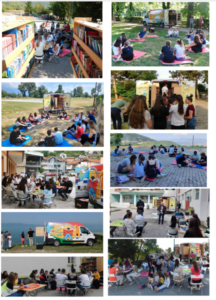In the editorial of the previous issue, we discussed a natural disaster that struck a small Balkan country. Now, we find ourselves facing another natural disaster that is striking the entire planet and has paralysed almost all spheres of life (even our online magazine has been affected and we apologise to readers for the delay in publication of this issue). The cause of the disaster is a tiny, submicroscopic thing, a virus, a coronavirus, called Covid-19, or SARS-CoV-2. It is a new, very insidious virus, highly infectious, highly contagious. Doctors and scientists find themselves facing the unknown. One says one thing, another the opposite, indeed too often specialists contradict themselves within a matter of days. The consensus that presupposes a scientific truth is missing in many aspects: We are still in the phase of trial and error, thus science has still not managed to predict nor find a quick solution. The only solution that 21st century science has proposed up to now is the Medieval response to the Black Death that plagued Europe: Enclosure, the greatest isolation possible from one another. Thus, a large number of residents of this planet have been enclosed inside four walls, for weeks on end. Science requires time in order to find, through a process of trial and error, the truth and thus to protect humanity from this evil.
Meanwhile, the consequences of this crisis extend beyond health and will be severe. First, we will be much poorer, with an economic decline unprecedented in decades: On this there is consensus among economists. Second, humanity has been conquered not only by the coronavirus epidemic, but also by an epidemic of fear about the present and future. Both poverty and fear, as well as the extraordinary empowerment of governments of nation-states at a time when they are also shutting out one another, constitute the perfect terrain for a regression toward national- populist authoritarianism, which has seen an alarming expansion in the democratic West in recent years. What will happen to democracy?
Will it be able to resist the authoritarian temptations of a population which is frightened and hostile to the world? What about the European Union, which most recently opened its doors to the Western Balkans – what will it be like in the near future? The signs are not good: The richest countries are maintaining a similar position as they did in the financial crisis of 2008- 2010, toward countries that are less rich, and this is harming European integration, undermining its very foundations. As Jaques Delors, one of the protagonists of the Maastricht Treaty said: “The climate that seems to hang over the heads of state and government and the lack of European solidarity pose a mortal danger to the European Union. The virus is back.” It is clear to what old European virus he was referring. Not to mention the position that the EU holds towards Syrian refugees, as it violating respective international conventions and at the same time its own declared values, not just by building walls to keep the refugees out, but also by giving prior blessing to the use of live weapons against refugees by Greece, the first Balkan state to join the EU.
From the very beginning, Jean Monnet, one of the earliest architects of united Europe, expressed concerns about the future of this project, arguing that building Europe had to begin with culture. But culture, in the dominant ideological model, is seen as entertainment or luxury, and therefore, it is the first to be sacrificed in times of economic hardship. We are far from that which Winston Churchill said in the midst of the Second World War: “If we sacrifice our Culture, then can anyone tell me why we are fighting this war?”
Translated by Alexandra Channer
The publication of this issue of “The Bridge” was made possible by a grant from the Foundation Open Society Institute in cooperation with OSIFE of the Open Society Foundations, and by a grant from European Cultural Foundation (www.culturalfoundation.eu).




